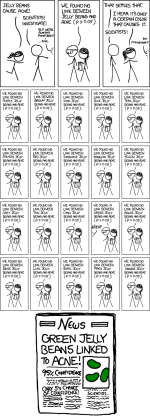Underseer
Contributor
https://www.cnbc.com/2018/11/27/gen...p-threatens-to-cut-subsidies-for-company.html
[YOUTUBE]h-HAX3nWORI[/YOUTUBE]
Watson makes a good point about methodology (caveat: I'm not a scientist by any stretch of the imagination, so I'm far from an expert on methodology).
A scientific hypothesis needs to be falsifiable before you design the methodology.
The hypothesis in this would be "hey, if we test for enough organic compounds in the air around a mass of humans, I bet we can find one that correlates with just about anything!"
Of course, this does not prove a causal link.
[YOUTUBE]h-HAX3nWORI[/YOUTUBE]
Watson makes a good point about methodology (caveat: I'm not a scientist by any stretch of the imagination, so I'm far from an expert on methodology).
| Good methodology | Based on our understanding of neuroscience, we think organic compound X in the air will correlate with movie rating. Let's show people a bunch of movies and measure the amount of organic compound X in the air at each showing. |
| Bad methodology | Hey, let's show people a bunch of movies, measure all of the organic compounds in the air, and arbitrarily pick the one that happens to correlate with the movie rating. |
A scientific hypothesis needs to be falsifiable before you design the methodology.
The hypothesis in this would be "hey, if we test for enough organic compounds in the air around a mass of humans, I bet we can find one that correlates with just about anything!"
Of course, this does not prove a causal link.
Trigger Warning
In the past, Rebecca Watson has argued that women are not mere objects that exist for the titillation and pleasure of men. Forum members of a more delicate nature (e.g. conservatives, libertarians, or anyone who uses terms like "social justice warrior") should think twice before clicking on the above video. I will not be held responsible for any rage or tears that result.
In the past, Rebecca Watson has argued that women are not mere objects that exist for the titillation and pleasure of men. Forum members of a more delicate nature (e.g. conservatives, libertarians, or anyone who uses terms like "social justice warrior") should think twice before clicking on the above video. I will not be held responsible for any rage or tears that result.

